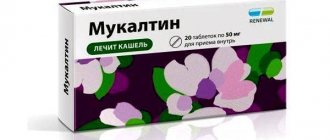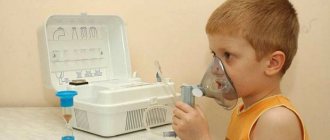Hello dear readers. The human body is sensitive to many external factors, but sudden temperature changes have a particularly strong effect on it. Any cold snap will entail a wave of diseases, which will quickly “cover” any weakened body. If the immune system of an adult still somehow copes with colds, then the child’s still unformed body is unlikely to be able to overcome the infection that enters it on its own. It often happens that a cold seems to recede, but some of its consequences may remain. We are talking about a painful cough that is quite difficult to cure in a short time. It’s one thing when a child simply coughs throughout the day, but at night the body can recover and rest. But when a debilitating cough does not leave the baby either day or night, it is necessary to act urgently.
If a symptom has just appeared, it is better to consult a doctor as soon as possible. Well, if the treatment does not bring improvement, then it is important to inform the doctor, who will probably change the medications.
If during the day the child can somehow distract himself from coughing, then at night the attacks seem stronger and more frequent.
For this reason, the baby may not sleep all night, which significantly slows down the healing process.
In order to help your child overcome a night cough, you must first of all simply consult a doctor.
But before that, we, as responsible parents, must know exactly how to help our child cope with this unpleasant symptom.
What can only worsen a night cough?
Probably every parent is concerned with the question of why the cough gets worse at night? Usually we attribute everything to the fact that at night we simply do not have an activity that would distract us from this symptom.
During the day, for example, we simply don’t pay attention to the cough because we are very busy. Do you really think that's all there is to it?
Factors that contribute to increased night cough:
✔ It is at night that some changes occur in our body in the functioning of the nervous and endocrine systems. The work of the nervous system increases, which is the reason for the narrowing of the bronchi, which is why the process of sputum discharge becomes impossible. Thus, we get a dry, debilitating cough.
✔ The usual blood circulation of the respiratory organs is disrupted, the reason for which is staying in a supine position. This means that the discharge of sputum stops, but coughing attacks continue to attack.
✔ If the only manifestation of a cold is a runny nose, then during the day the baby will not be bothered by anything except constant nasal discharge, but at night everything will change. In a horizontal position, mucus from the nasal cavity slowly approaches the throat, which can cause coughing attacks.
✔ The appearance of an unreasonable cough at night may indicate the presence of an allergen in household objects surrounding the child at this time of day. This could be dust mites or pet hair left on the bed. If your baby is prone to constant allergies, then a new allergen can add to an already large collection.
✔ Dry air can also provoke a cough, because it is at night that we close all the windows for fear of catching a cold. This means that the supply of moist air will be blocked. The air becomes dry due to the continuous operation of the heating radiator, which helps us keep warm during the cold season.
All these factors can only worsen an existing disease, which is precisely the cause of the annoying cough.
Causes of trouble
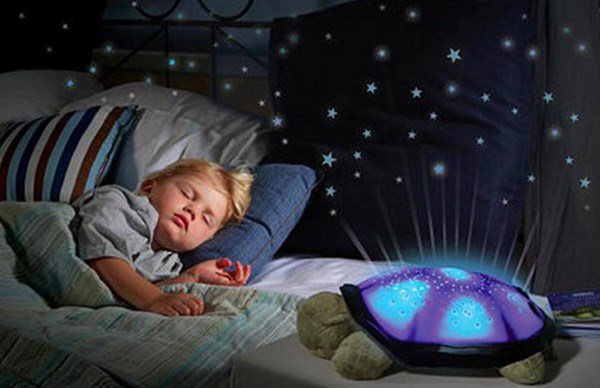
When the baby is in a horizontal position at night, mucus accumulates in the upper respiratory tract. In children, the pulmonary apparatus is not yet perfect, the respiratory bronchial tubes have a small lumen, and the removal of mucus is difficult. The body, trying to get rid of phlegm, provokes the development of a reflex.
There are many reasons for a child’s night cough; prolonged attacks often develop due to colds and infectious diseases.
Before treating a child’s night cough, pay attention to the type of reflex: . Pharyngitis, rhinitis, sinusitis
Dry, irritating cough. It differs in the duration of the attacks. The baby complains of soreness and tingling in the throat. Choking and coughing are observed during the interval between the main attack.
Pharyngitis, rhinitis, sinusitis. Dry, irritating cough. It differs in the duration of the attacks. The baby complains of soreness and tingling in the throat. Choking and coughing are observed during the interval between the main attack.
Asthmatic bronchitis. The symptom passes with whistling and wheezing breathing. With an asthmatic night cough, the child develops shortness of breath and finds it difficult to breathe. The baby complains of pain in the sternum near the heart.
Whooping cough. Whooping cough consists of 5-10 shocks. They follow non-stop, not allowing the child to breathe. Trying to take in air, the baby makes a whistling sound. The cough is loud, barking and moist, with copious sputum. Mucus is viscous and glassy. In small children, it can separate through the nostrils in bubbles.
Whooping cough often leads to vomiting caused by copious amounts of mucus. The baby's face turns red, trying to clear his throat, he sticks out his tongue and tenses. The cough is so strong that it completely exhausts the child, leading him to exhaustion.
Adenoiditis. The cough symptom for adenoids is characterized by dryness and difficult to separate purulent sputum. Night cough develops even with advanced disease, when viscous mucus accumulates in the nasal passages, descends into the respiratory tract and irritates the laryngeal mucosa.
Gastroesophageal reflux. This pathology is characterized by a dry night cough without fever and sore throat. Manifestations of the syndrome are similar to coughs due to bronchitis or allergies. Strong coughing can cause vomiting and nausea in a child.
Allergy. An allergic night cough begins suddenly. It is loud, barking and often dry (when wet, the child produces clear mucus). An allergic cough goes away with a runny nose and sneezing, but without fever. The child may complain of itching and sore throat.
Colds, flu, parainfluenza. The syndrome develops suddenly, and a high temperature may rise rapidly. Chills and fever are observed. At the onset of the disease, night cough is characterized by dryness and severe debilitating attacks. The child complains of a sore throat and sore throat.
Tracheitis. At the beginning of the development of the disease, a dry, paroxysmal cough is noted. Painful attacks often occur in the morning. The symptom is accompanied by severe, raw pain in the throat.
In small babies, an attack often develops while crying or screaming. At the same time, the temperature rises (up to +30-40⁰ C), headaches are observed.
Helminthic infestations. Helminthiasis is becoming a common cause of dry cough in a child at night. Helminthic infestations provoke the development of the syndrome at night without symptoms accompanying other diseases (sore throat, chills, fever). Children complain of abdominal pain, nausea, dizziness and upset bowel movements.
A child may develop a night cough due to dry, cold air in the room. The attacks disturb the baby, preventing him from sleeping peacefully during teething, when a lot of saliva is formed and it flows into the larynx area, provoking a cough reflex.
When a child has been bothered by a cough at night for a long time, or feels tired and exhausted during the day, he should immediately seek help in treatment from a pediatrician. Don't self-medicate! Only a pediatrician can find out the real culprit of a child’s night cough and prescribe proper treatment.
What are the causes of night cough in a child?
Why does cough occur at all? Even during the day the child felt well, but just before bedtime he began to have severe coughing attacks.
The most common cause, of course, is a cold, but besides that, there are others:
Bronchial asthma is chronic, and attacks can occur at any time of the day.
Allergic reactions occur especially during the flowering period of certain plants, which, in fact, are allergens. Allergy season typically ranges from late spring to early fall.
Whooping cough is the most common infectious disease among children, and its main symptom is cough.
Inflammatory processes of the mucous membranes of the respiratory organs (pharyngitis, laryngitis, rhinitis);
Gastroesophageal reflux involves the release of gastric juice into the esophagus. Thus, the acid will irritate the mucous membrane of the pharynx, which can cause coughing. In addition, the liquid may well get into the bronchi, which will not have the best effect on the baby’s health.
Seasonal viral infections that provoke inflammatory processes in the body.
Entry into the oral cavity of a foreign object that may block the airways.
Treatment for each disease will be different, so as such there is no general cure for getting rid of night cough.
But we offer you important tips for caring for your child during coughing attacks, which will help alleviate his condition and ensure your baby sleeps soundly.
Tips for caring for your child during night coughing attacks
If, having settled comfortably in a warm bed, your child begins to experience severe coughing attacks, then you need to:
✔ Approach him as often as possible throughout the night.

You must make sure that he is fast asleep and nothing disturbs him. Just when he falls asleep, you should turn him from one side to the other from time to time so that the mucus in the lungs does not stagnate. Especially if your baby is not yet a year old.
✔ Place a few more pillows under the child's head to prevent mucus from the nose from moving into the throat.
In addition, the process of sputum discharge will be more effective in this position;
✔ Rinse your baby's nose in advance with salted water or special drops with the same effect.
This way, it will be easier for him to breathe through his nose, which means that the child’s cough will not bother him throughout the night.
✔ Provide your child with plenty of fluids in the form of warm milk with honey or herbal tea.
Such drinks promote the removal of mucus, but in addition, they also soothe the mucous membrane of the respiratory tract. This way, the mucous membranes will not be irritated, which means the cough will subside.
✔ Increase air humidity by ventilating the room before putting your child to bed.
Although there is a much simpler way - turn on a special device for humidifying the air. This is the type of humidifier that will provide your baby with deep, restorative sleep.
If now is not the best time to purchase such an impressive purchase, then you can humidify the air in other ways.
It is enough to simply place several vessels with water in the child’s room, or hang wet towels or other fabric on the radiators.
child coughs before bed
I shared it with my friends, I’ll write here too, in case there are comrades in misfortune here
It all started in the summer, with small, occasional coughing and choking, often in the morning, when the child was not doing anything, for example, just watching cartoons. We went to the local pediatrician, she is also a family doctor, as they call them here. Well, she is generally unique among us, firstly, she goes to study all the time, it feels like she should have already written a couple of doctoral dissertations. If she is not studying, then she is on vacation. Or is sick. In between this, he conducts the reception. You understand how easily and quickly you can get to her if you have an urgent need. But there is no alternative as such in our village.
In general, the pediatrician said that it was a neurogenic cough and prescribed a mixture for nerves and a spray based on sea buckthorn in the throat. And go to a psychologist. No, well, of course we were gone for 2 months. Not a thing has changed, then Nika went on vacation, came back, went to the garden, was away with these coughs for a month, then she was sick for a week, went out again for a couple of weeks, the coughs mainly bothered me, I went to the pediatrician again, she again listened to the lungs and sent me home.
And then things got tough, they caught some kind of virus, vomited, had diarrhea, and developed a fever. And against this background, the choking developed into a terrible barking cough, which gave neither me nor the child any rest. We rush to the doctor again, she is on vacation, the assistant questions laryngitis and prescribes syrups. The small one is worse, and it coughs and has a “scratchy” throat. We go to a paid pediatrician, donate blood and do an x-ray. We drink more syrups while waiting for tests, and inhale with saline. This makes it even worse.
As a result, the X-ray shows bronchitis, in the blood there are slightly elevated esonophils (am I writing correctly?), not critical, maybe parasites, or maybe allergies (but a year ago we checked her very thoroughly for allergens), we treat bronchitis, the “barking” is gone , the soreness remains (for a week and a half now, no worse and no better, especially pronounced before and after bedtime, sometimes during the day there is almost no soreness). And, the main mystery that baffles doctors: She does NOT cough at night (she coughed only with bronchitis, in an acute condition, and then only when falling asleep), in general she sleeps very quietly. All 3 doctors unanimously say that the breathing is very clear, that the problem is in the throat itself. But they don’t know what the problem is. Yes, snot is running down the back wall, again it is not known why, but the doctor says. that they would make me cough at night. which means that the cough during the day is not caused by them. allergy? She coughed on vacation, she coughed when she lived with her grandmother for 3 days; there are no animals there, for example. Asthma? But she breathes easily and calmly. Adenoids? Worms? From the latter we started a course of vermox. And we made an appointment with the ENT specialist. They also took a throat swab. I'm actually kind of confused. I’ve been at home for almost a month, I’m not allowed to go to kindergarten, I’m afraid to take me to clubs myself, lest I end up staying at home for another couple of weeks without even having time to show up at kindergarten. And most importantly, I want to get to the bottom of the nature of these coughs that are driving my nervous system crazy...
Night cough in a child - pharmaceutical drugs
Before considering the most effective drugs that can overcome a cough, it is necessary to clarify that drug treatment is always prescribed only by the attending physician. Therefore, you should not self-medicate, especially when it comes to a small child.
So, severe coughing fits keep your child awake, which means you may lose sleep too. Depending on the type of cough, as well as the cause of its occurrence, certain medications are prescribed.
To help combat dry cough:
- Sedotussin, Glauvent (relieve irritation of the mucous membrane, thereby suppressing the cough reflex).
- Libexin also helps to reduce the sensitivity of mucous membrane receptors.
- Bronholitin soothes a debilitating cough and also promotes the discharge of sputum.
For a wet cough, the following is usually prescribed:
- Expectorants that help speed up the process of sputum discharge (Pertussin, Mucaltin, Bronchicum).
- Mucolytic agents that thin out too thick mucus (Ambrobene, Bromhexine).
- Antiallergic drugs that eliminate cough (Erius, Terfen).
- Antibiotics are used in cases of serious inflammation of the respiratory system (pneumonia).
TOP - 12 folk remedies when a child has a night cough
The main treatment, of course, is the use of medications, because this is the only way to completely get rid of the cough.
But to alleviate this painful symptom at night, it is necessary to turn to traditional medicine, which always has several effective remedies in its arsenal.

But do not forget that even the use of alternative medicine requires consultation with a doctor. Especially if your child is still very young.
The following remedies will help you fight a cough:
- Warm milk with soda added (half a teaspoon). This remedy will help cope with dry cough. Along with it, a well-known remedy is actively used - milk with honey, which has the same effect.
- Tea with raspberry jam. To enhance the effect of the active substances of raspberries, you should prepare herbal tea (preferably some kind of mixture with an expectorant effect). In this case, simple black or green tea will be of little use. With such success, you can prepare a regular raspberry compote (by stirring a spoonful of jam in boiled warm water).
- Burnt sugar , or, as it is also called, “burnt sugar”. Pour a tablespoon of sugar into a special bowl, which is placed over medium heat. We wait until the sugar turns into amber caramel, after which we add this syrup to a glass of hot milk and stir thoroughly. It is necessary to allow the drink to cool, because drinking hot liquid can burn the already inflamed mucous membranes of the throat.
Add a few drops of aloe to the resulting mixture. After this, you can begin treatment by drinking homemade syrup three times a day.
- Banana syrup. To prepare, you will need one finely grated banana, which must be mixed with one tablespoon of liquid honey. Heat the resulting mixture on the stove until it darkens (this may take about 10 minutes). We distribute the syrup into several doses, which need to be carried out over the course of one day.
- Ginger tea with lemon and honey. You will need one tablespoon of finely grated ginger, which is placed in a cup in advance. We also put a tea bag there, for example, green tea, because it is so beneficial for a weakened body. Pour boiling water over and leave for a while to brew completely. Add a little honey or your favorite jam to the warm drink. A slice of lemon will complement this healthy drink. It is advisable to take this remedy every two hours.
- Onions with sugar and honey. You need to immediately prepare a glass of chopped onion (preferably grate it on a fine grater), and mix it with the same glass of sugar. Boil the mixture for five minutes. Add 2 tablespoons of liquid honey to the cooled onion mass. Give your baby a teaspoon every hour.
- Honey with mustard. To prepare, you will need half a standard stick of butter, 5 teaspoons of honey and just one teaspoon of dry mustard. Mix all ingredients thoroughly, then give your child one teaspoon of this product before meals.
- Black radish with honey. We choose a medium-sized root vegetable from which we will have to cut off the “cap”. After this, you should cut out the core of the vegetable using a special sharp spoon. Place a certain amount of honey into the resulting cavity and let the product brew. After a few hours, the vegetable will release its healthy juice, which will mix with honey. Take one teaspoon every two hours.
- Ground viburnum helps speed up the discharge of sputum. Fresh viburnum berries must be ground through a sieve and then mixed with honey. You can choose the proportions yourself, but it is advisable that the berry mass exceeds the amount of honey several times. The child should be given a tablespoon up to four times a day.
- Compress based on mashed potatoes. Place a certain amount of the prepared puree on a separate plate and let it cool slightly. We distribute the warm potato mass over the surface of the child's back and cover it with cling film, and wrap it with a warm scarf on top. The procedure will last until the mixture has completely cooled.
- Pine buds boiled in milk. Boil half a liter of milk with the addition of a tablespoon of kidneys, boil for about five minutes, and immediately remove from heat. Leave the product for an hour so that it infuses properly. Give the child 50 g every two hours.
- Herbal collection with expectorant effect. Soothes coughs and also relieves irritation of the mucous membranes of the respiratory tract. This product can be purchased at any pharmacy, and its price will not be high.
How to help at home
Self-treatment is only permissible for mild coughs. In more severe cases of pathology, you should definitely consult a doctor. Self-medication is dangerous because home methods usually only eliminate the symptoms of the disease. They blur the picture of the infection, the parents think that the child has gotten better. In fact, the pathology continues to progress. Prolonged course without specific therapy can lead to serious consequences.
A child with a night cough should definitely be seen by a doctor. After examination and diagnosis, the specialist prescribes specialized treatment. You can use additional folk remedies, but only together with therapy, and not instead of it.
Sufficient indoor humidity
Coughing may occur due to dry air in the bedroom. The bronchial tree is irritated by dust particles that enter the respiratory tract, which leads to the appearance of a symptom. Therefore, before going to bed, it is recommended to ventilate the room and do a little wet cleaning. At the moment of ventilation, you need to take the baby to another room so that he does not get blown out. You can use special air humidifiers that quickly saturate the bedroom with moisture.
Bathing
Immediately before bedtime, it is necessary to carry out water procedures. They have a beneficial effect on the body. The layer of dust and dirt that inevitably accumulates during the day is removed from the skin. Bathing also has a positive psychological effect. After water procedures, the child calms down, which reduces the likelihood of neurogenic coughing. To achieve this effect, you can add a few drops of essential oils to the water, which have a calming effect on the baby.

Inhalations
Inhalation of saline solutions moisturizes the mucous membrane of the bronchial tree, reducing the severity of dry cough. The procedure directly affects the respiratory tract, promoting the removal of mucus. Regular use of the technique calms the child, so he falls asleep faster.
Parents should understand that inhalations should be done for bronchitis, pneumonia or colds. For other pathologies they are ineffective. It is prohibited to carry out procedures for laryngitis and allergic reactions. A contraindication to inhalation is severe fever.
Folk remedies
Home treatment methods include:
- Warm milk with honey. The solution warms the throat and stimulates local blood circulation.
- Drink plenty of water (compotes, tea with raspberries, fruit drinks). The intake of fluid into the body reduces the severity of intoxication.
- Potato compresses applied to the chest. The product has a mild effect on the condition of the respiratory tract.
- Rubbing. The procedure warms up the skin and accelerates blood circulation in the lung area.

Pharmacy drugs
To treat coughing, medications are used that have an expectorant and mucolytic effect. You can buy lozenges or baby syrups at the pharmacy without a doctor's prescription. The most effective drugs are Mucaltin, Ambrobene, Travisil. Regular use of these drugs stops the progression of the symptom and helps cleanse the bronchial tree by liquefying sputum and releasing it through coughing.
How to treat a child’s night cough - a special diet
In addition to the main type of treatment, as well as special folk remedies, you can ease the child’s well-being with dishes that are familiar to us.
So, if your baby is tormented by a night cough, then the following dishes will come to his aid:
Mashed potatoes with milk and butter added. Such an ordinary dish will not only relieve the inflammatory process, but also, thanks to starch, will become an excellent assistant in the matter of liquefying phlegm.
Oatmeal with a teaspoon of vegetable oil. Usually this porridge is cooked in milk and a little butter is added, but for better absorption of all the beneficial substances of this type of cereal, you need simple refined oil.
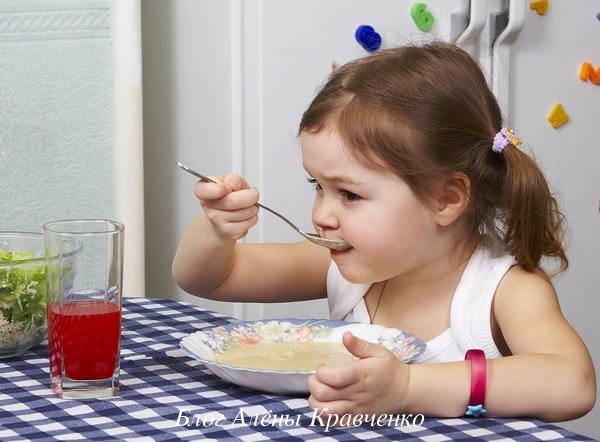
Fresh juices. It can be either orange juice or tomato juice, so there are no restrictions here. In addition, different types of juices can be combined to create new and interesting mixes.
Fresh grapes. If your baby is sick in the fall, then you still have the opportunity to pamper him with such a healthy yummy.
Bananas can be found on supermarket shelves at absolutely any time of the year, so you can surprise your child with delicious desserts based on this fruit every day.
Citrus fruits are a major source of vitamin C , which will help strengthen your baby's immune system. In addition, ascorbic acid helps to liquefy mucus and remove it.
Cranberry juice will also be useful for restoring the body’s protective function, so if you have the opportunity to treat yourself and your baby to cranberries, don’t miss it.
A rosehip-based decoction will strengthen weak immunity and also help restore order to the functioning of the entire body, including the excretory system.
Grape juice with added honey. If the season of fresh grapes has already passed, but you still want grapes, then replace it with a delicious grape cocktail, which will be even more useful if you add a little honey to it.
These products on their own will help cope with this disease, but if they are prepared correctly and combined with other similar products, the effect will be much better.
Overcoming a child’s night cough is not as easy as it seems at first glance, therefore, first of all, you need to consult a doctor.
Only he will be able to prescribe the correct treatment for the baby, as well as give advice on the use of certain traditional methods.
And you should not delay the treatment of night cough, because even such a symptom may not indicate an illness that can develop into a serious illness.
Consequences of viral and colds
The appearance of a cough at night indicates that the baby has not yet recovered from the cold. The attacks are accompanied by a barking cough and difficult to clear sputum.
A poorly treated cold is dangerous due to the appearance of diseases: sinusitis, otitis media, pneumonia, bronchitis. Bronchitis is dangerous for a child due to serious breathing problems, shortness of breath, and oxygen deprivation.
Chlamydia is a sexually transmitted disease. In children, infection occurs through household contact with adults. Night cough occurs against the background of conjunctivitis.
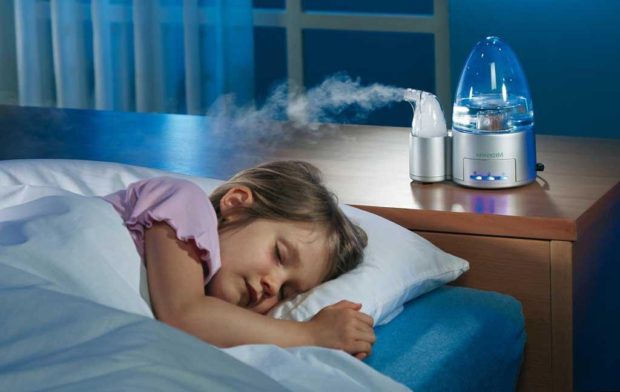
Humidifying the air soothes coughs
Whatever the cause of a cough, this is always an alarming sign that indicates that a doctor’s consultation is necessary.
Emergency assistance to a child in case of a night attack is required in the following situations:
- The attack develops unexpectedly and lasts for some time.
- The cough is accompanied by a hoarse sound from the lungs.
- Green sputum is produced.
- When you cough, blood appears.
- The child is vomiting.
- The attacks are accompanied by a sharp increase in temperature and shortness of breath.
Parents, trying to help their child, often make the situation worse. Wrong actions can damage the baby’s health and lead to death.
What not to do if you have a night cough:
- Rub the skin and do inhalations if the child is under six months old.
- Give antibiotics and antihistamines to alleviate the condition without consulting a doctor.
- It is strictly prohibited to treat a child’s dry cough at night with antitussives.
- Do not suppress a wet cough using antitussive medications.
Dietary food helps relieve coughing attacks that occur in a child at night. The beneficial substances contained in food help improve well-being and relieve cough.

Honey and cranberries are an effective remedy
The daily diet should include the following dishes:
- puree with milk;
- freshly squeezed juice;
- fruits high in vitamin C (citrus fruits);
- rolled oats porridge;
- vegetable salad with radish.
A few days spent on an antitussive diet, and the child’s condition will noticeably improve. Products included in the diet help remove mucus and relieve spasms. Some foods can cause allergies in children, so parents should exercise caution.









